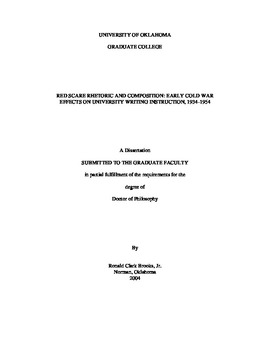| dc.contributor.advisor | Hobbs, Catherine L., | en_US |
| dc.contributor.author | Brooks, Ronald Clark, Jr. | en_US |
| dc.date.accessioned | 2013-08-16T12:19:26Z | |
| dc.date.available | 2013-08-16T12:19:26Z | |
| dc.date.issued | 2004 | en_US |
| dc.identifier.uri | https://hdl.handle.net/11244/750 | |
| dc.description.abstract | This dissertation investigates composition and communication philosophies and practices from the years 1934--1954. Generally speaking, writing instruction suffered during the Cold War because the political climate reduced humanist teaching to formalist teaching, progressive teaching to permissive teaching, and empiricist teaching to objectivist teaching. In order to illustrate these reductions, I investigate the ways that anticommunist philosophies influenced university epistemologies before and after WWII. A thorough description and analysis of one of the first academic freedom cases in the Cold War (i.e., the University of Washington case) helps outline the precedent for the objectivist turn in university philosophy. The results of this turn are investigated in textbooks by James McCrimmon, and Cleanth Brooks & Robert Penn Warren; in the teaching practices of Theodore Baird and Charlton Laird; in the rhetorical philosophy of Richard Weaver; and in the published responses to anticommunism by the NCTE. I also investigate many of the exceptions to the objectivist turn in writing instruction. These are found in the teaching philosophies of Kenneth Burke, Herbert Weisinger, Albert Kitzhaber, and many of the scholars at the first meetings of the Conference on College Composition and Communication. Finally, I build on the objectives that were presented at the second Conference on College Composition and Communication and argue for a theory of composition based on a progressive vision of democracy. By combining the best elements of humanist, empirical, and progressive teaching philosophies, this vision stands directly against both the internal and external sources of repression that we, as composition teachers, face in our everyday teaching lives. | en_US |
| dc.format.extent | v, 251 leaves : | en_US |
| dc.subject | English language Rhetoric Study and teaching United States History 20th century. | en_US |
| dc.subject | History, United States. | en_US |
| dc.subject | Education, Higher United States History. | en_US |
| dc.subject | English philology Study and teaching (Higher) United States History 20th century. | en_US |
| dc.subject | Language, Rhetoric and Composition. | en_US |
| dc.subject | Education, Higher. | en_US |
| dc.subject | Education, History of. | en_US |
| dc.subject | Education, Language and Literature. | en_US |
| dc.title | Red Scare rhetoric and composition: Early Cold War effects on university writing instruction, 1934--1954. | en_US |
| dc.type | Thesis | en_US |
| dc.thesis.degree | Ph.D. | en_US |
| dc.thesis.degreeDiscipline | Department of English | en_US |
| dc.note | Adviser: Catherine L. Hobbs. | en_US |
| dc.note | Source: Dissertation Abstracts International, Volume: 65-05, Section: A, page: 1763. | en_US |
| ou.identifier | (UMI)AAI3134392 | en_US |
| ou.group | College of Arts and Sciences::Department of English | |
